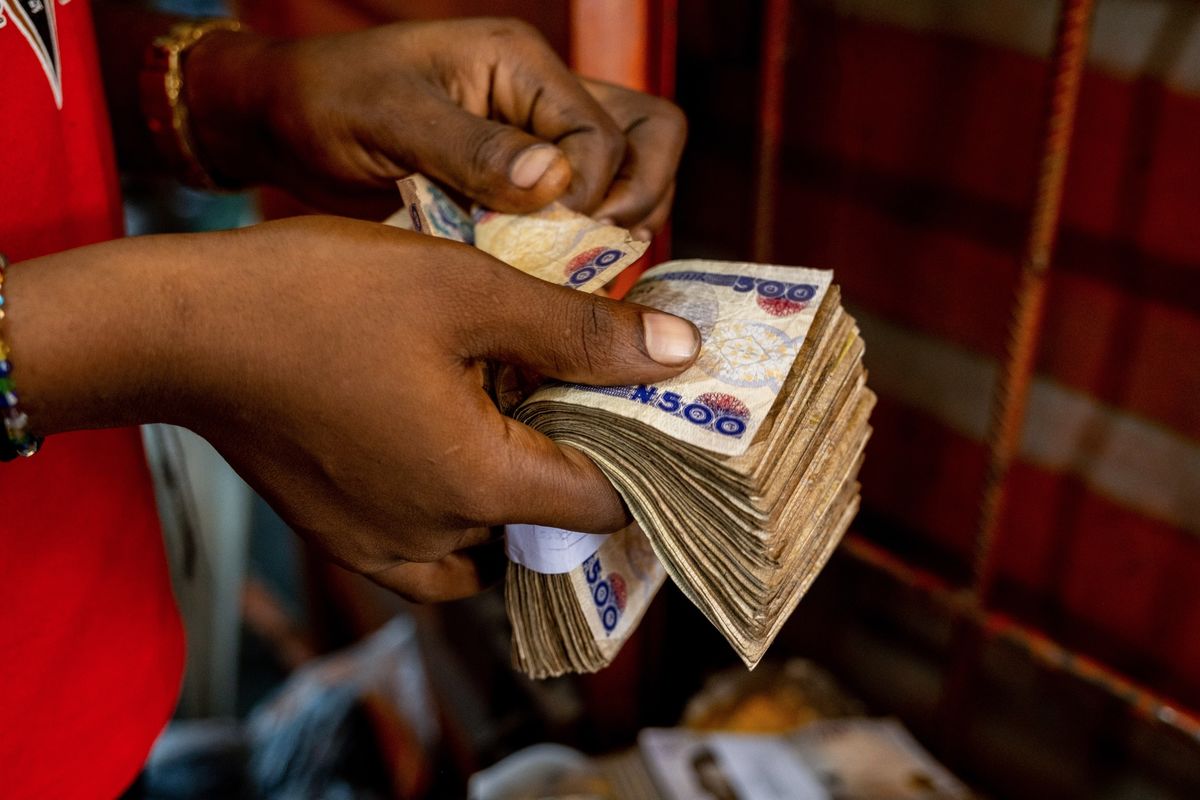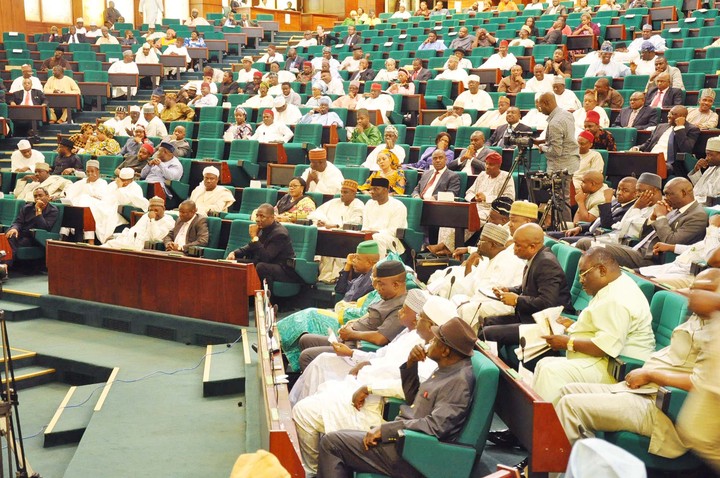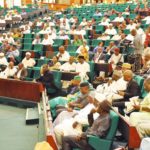Economy
We’ll Adopt Managed Floating Exchange Rate System—CBN

By Adedapo Adesanya
The Central Bank of Nigeria (CBN) has said it will not completely float the Naira in the foreign exchange (FX) market, stating that it adopt the managed floating exchange rate system so as to have a bit of control of the exchange rate in the country, a report by Bloomberg says.
Mr Kingsley Obiora, a deputy governor of the apex bank, told the publication in an interview in Rabat, Morocco.
This is as it continued to float its currency which was initially announced last week and has sent the local currency spiralling to a new low of N770 per Dollar at the Investors and Exporters (I&E) FX Market on Monday evening.
“We are allowing the market itself to set a price,” Mr Obiora reportedly said.
“There is no country in the world, even the US, that has a completely free float,” he added.
The central bank will continue to pursue a managed float, he further said.
Mr Obiora expects that the supply of foreign exchange will eventually be unlocked once the price of the Dollar reaches a fair level that both buyers and sellers consider.
He warned that it may be too early to determine if the Naira’s exchange rate to the Dollar has bottomed out.
He also pointed to an analysis done by the International Monetary Fund (IMF) and international banks like Goldman Sachs, which correctly suggested that the local currency should not be as weak as the parallel market indicated.
He lauded the recent moves by President Bola Tinubu, saying that the removal of fuel subsidies, along with the convergence of the exchange rates, will drive economic growth.
He said Nigerians can expect this from next year when the policies start making an impact.
“I completely expect us to do 5 per cent to 6 per cent growth next year,” he said. “Over the next four years, you may see the GDP approach something like $600 billion to $700 billion,” he said.
Economy
NASD OTC Exchange Closes Lower for Fifth Consecutive Day

By Adedapo Adesanya
The NASD Over-the-Counter (OTC) Securities Exchange suffered its fifth decline for this week on Friday after it closed lower by 0.09 per cent, with the Unlisted Security Index (NSI) down by 8.91 points to 3,639.10 points from 3,642.22 points and the market capitalisation declining by N1.86 billion to end N2.177 trillion compared with the previous day’s N2.179 trillion.
Yesterday, the bourse recorded three price losers led by NASD Plc, which crumbled by N4.00 to close at N55.00 per share compared with the previous day’s N59.00 per share, as FrieslandCampina Wamco Nigeria Plc depreciated by 68 Kobo to N66.23 per unit from Thursday’s closing price of N66.91 per unit, as Mass Telecom Innovation Plc lost 4 Kobo to end at 40 Kobo per share versus the preceding day’s 44 Kobo per share.
On the flip side, there were two price gainers led by Central Securities Clearing System (CSCS) Plc, which added 21 Kobo to close at N40.81 per unit compared with the previous session’s N40.60 per share and UBN Property Plc, which improved by 10 Kobo to N2.09 per share from N1.99 per share.
During the session, the level of activity increased as the the volume of transactions surged by 255.7 per cent to 10.2 million units from 2.9 million units, the value of trades soared by 122.0 per cent to N189.5 million from N85.4 million, and the number of deals increased by 22.5 per cent to 49 deals from the previous day’s 40 deals.
When the bourse ended for the day, CSCS Plc remained the most traded stock by value on a year-to-date basis with 10.5 million units worth N427.7 million, trailed by FrieslandCampina Wamco Nigeria Plc with 893,553 units traded for N60.1 million, and MRS Oil Plc with 291,801 units valued at N58.3 million.
However, CSCS Plc took over as the most active stock by volume on a year-to-date basis with 10.5 million units old for N427.7 million, as Geo-Fluids Plc slipped to second place with 7.7 million units worth N52.4 million, and Mass Telecom Innovation Plc occupied the third spot with 6.2 million units transacted for N2.5 million.
Economy
Naira Value Improves to N1,421/$1 at Official Market

By Adedapo Adesanya
The Naira appreciated against the US Dollar by 44 Kobo or 0.03 per cent in the Nigerian Autonomous Foreign Exchange Market (NAFEX) on Friday, January 24 to sell for N1,421.63/$1 compared with the N1,422.07/$1 it was traded on Thursday.
This was buoyed by increased FX inflows from exporters as well as sustained Dollar volume from non-bank corporate, individual and other sources.
However, the Naira lost N15.61 against the Pound Sterling in the same market window yesterday to quote at N1,924.17/£1 compared with the previous day’s value of N1,908.56/£1 and depreciated against the Euro by N3.60 to finish at N1,669.56/€1 versus the N1,665.96/€1 it was exchanged a day earlier.
At the GTBank forex counter, the Nigerian currency traded flat against its American counterpart at N1,430/$1, and also maintained stability against the greenback at the parallel market segment during the session at N1,485/$1.
Meanwhile, the cryptocurrency market took a hit as slowdown occurred, explained by large holders taking profits.
The market had seen a short lived boost after Japanese intervention sent the Yen surging against the US Dollar, a move some saw as a necessary step toward resuming a bull market in crypto.
However, investors took profit with Dogecoin (DOGE) down by 0.8 per cent to $0.1240, and Cardano (ADA) down by 0.7 per cent to $0.3585.
Further, Solana (SOL) dropped 0.6 per cent to sell at $126.89, Litecoin (LTC) depreciated by 0.5 per cent to $68.42, and Binance Coin (BNB) fell by 0.1 per cent to $890.13.
But, Ripple (XRP) appreciated by 0.4 per cent to $1.91, Ethereum (ETH) rose by 0.3 per cent to $2,953.72, and Bitcoin (BTC) grew by 0.1 per cent to $89,477.58, while the US Dollar Tether (USDT) and the US Dollar Coin (USDC) traded flat at $1.00 each.
Economy
House of Reps Minority Caucus Identifies Alterations in Gazetted Tax Laws

By Modupe Gbadeyanka
The House of Representatives Minority Caucus Ad-hoc Committee on Tax Laws on the Allegations of Illegal Alterations on the Gazetted Tax Laws has released an interim report on its findings, accusing the executive arm of government of removing and inserting some items in the bills passed by the parliament.
The chairman of the 7-man panel, Mr Afam Victor Ogene, in the report released on Friday, said the laws were altered after they were transmitted to the executive by the National Assembly for assent by President Bola Tinubu.
Recall that a member of the green chamber of the parliament, Mr Abdulsamad Dasuki, raised an alarm on the discrepancies in the gazetted version and the one passed by the legislative arm of government.
The Minority Caucus of the House of Reps, headed by Mr Kingsley Chinda, in a statement on December 28, 2025, vowed to “unconditionally protect the independence of the legislature and our democracy.”
It then constituted the committee on January 2, 2026, to get to the roots of all the issues surrounding the scandal.
The next day, the lower chamber of the National Assembly, through its spokesman, Mr Akintunde Rotimi, released a statement announcing that the Speaker, Mr Abbas Tajudeen, had directed the release of the four tax reform Acts; The Nigeria Tax Act, 2025; The Nigeria Tax Administration Act, 2025; The National Revenue Service (Establishment) Act, 2025; and The Joint Revenue Board (Establishment) Act, 2025, duly signed into law by the President, for public record, verification, and reference.
The statement further added that the Speaker has also ordered an internal verification and immediate public release of the Certified Acts to eliminate doubts, restore clarity, and protect the sanctity of the legislature.
In its report yesterday, the panel said it discovered some alterations in the gazetted version, noting that, “given the anomalies, illegalities, and impunity observed, which clearly undermine the National Assembly’s constitutional powers and democracy, the committee finds the current evidence sufficient to warrant a deeper investigation. This will ensure accountability for the affront against the legislature.”
“To achieve this, the committee respectfully requests an extension to conduct a more thorough examination of the matter,” it added.
-

 Feature/OPED6 years ago
Feature/OPED6 years agoDavos was Different this year
-
Travel/Tourism9 years ago
Lagos Seals Western Lodge Hotel In Ikorodu
-

 Showbiz3 years ago
Showbiz3 years agoEstranged Lover Releases Videos of Empress Njamah Bathing
-

 Banking8 years ago
Banking8 years agoSort Codes of GTBank Branches in Nigeria
-

 Economy3 years ago
Economy3 years agoSubsidy Removal: CNG at N130 Per Litre Cheaper Than Petrol—IPMAN
-

 Banking3 years ago
Banking3 years agoSort Codes of UBA Branches in Nigeria
-

 Banking3 years ago
Banking3 years agoFirst Bank Announces Planned Downtime
-

 Sports3 years ago
Sports3 years agoHighest Paid Nigerian Footballer – How Much Do Nigerian Footballers Earn













